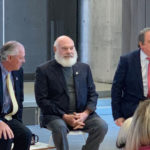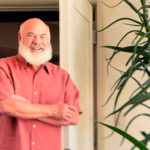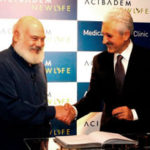Dr. Weil’s Gift To The University of Arizona
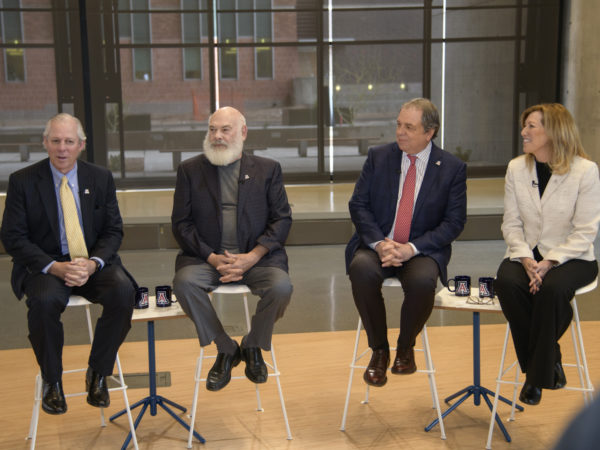
Joining Dr. Weil in this image: UA President Robert C. Robbins, M.D., UA Senior Vice President for Health Sciences Michael D. Dake, M.D., and Andrew Weil Center for Integrative Medicine Executive Director Victoria Maizes, M.D. | Photo courtesy of the University Of Arizona.
March, 2019 – Dr. Weil has donated $15 million to the University of Arizona for the expansion of the Center for Integrative Medicine, which will be renamed in his honor as the Andrew Weil Center for Integrative Medicine. Dr. Weil’s gift, which supplements $5 million he donated earlier, also will establish an endowed chair in integrative medicine, another for research in integrative medicine, and an endowed program fund for integrative medicine. It will help build modern new quarters for the Center on campus.
Here are Dr. Weil’s thoughts about his legacy, his gift and his vision for the future of healthcare:
This gift marks the high point in my career. It’s been 25 years since the Center in Integrative Medicine was established at the University of Arizona with the aim of redesigning medical education. I believed then – and still do – that we can impact and improve our nation’s struggling health care system by training physicians to focus on the innate healing potential of humans. Integrative medicine combines the best practices of modern medicine with an emphasis on lifestyle factors that influence health including nutrition, physical activity, mind-body interventions, spirituality, and natural therapies.
As you might imagine, 25 years ago there was a lot of skepticism about this approach. Fortunately, times have changed, and the importance of good nutrition and a healthy lifestyle are accepted as mainstream by most practitioners and by the estimated eight million patients our program has directly and indirectly served. A growing body of scientific evidence supports the use of botanical remedies, mind/body therapies, acupuncture and other “alternative” treatments.
In the beginning, the program consisted of a two-year residential fellowship that trained four physicians a year. Not surprisingly, people couldn’t imagine how I was going to change medicine by training so few people, but that modest start gave us a chance to develop a solid curriculum. We graduated 35 fellows from that initial program, some of whom are now in influential positions at institutions throughout the country. They’re directing integrative medicine centers at other universities and have written textbooks on the subject. Today we train 160 physicians (and nurse practitioners and physicians’ assistants) a year via a 1,000-hour online fellowship and have 1,800 graduates in all states and in 15 other countries. There is now a waiting list for the fellowship.
Also, a condensed curriculum of 200 hours has been adopted by 74 residency programs in the US and Canada (as well as in Taiwan and Germany). But there’s still a long way to go. Our goal is to have our curriculum become a required, accredited part of residency training in all fields of medicine. That would mean that every psychiatrist, dermatologist, gastroenterologist, and other specialist would have a solid grounding in nutrition, lifestyle medicine, mind/body interactions, and all the other important subjects now omitted from conventional medical education.
Through all our 25 years, the Center for Integrative Medicine has been self-sustaining through tuition. We’ve received some federal funds and have been helped by private philanthropy, but have never had state money. Even so, we have become the world leader in integrative medicine education. For a long time, we’ve wanted a home and financial stability. Visitors come from all over the world eager to see our center, and all we have to show them is a small house some distance from the medical campus. We have other offices some distance away, but nothing centralized. That will change when we have our new building, probably in 2022.
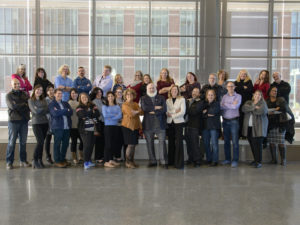
Andrew Weil Center For Integrative Medicine (staff) | Photo Courtesy of the University Of Arizona
And in 2020, the Center for Integrative Medicine will open an integrative medicine primary care clinic in Tucson in partnership with Banner Health, one of the largest nonprofit health care systems in the U.S. If we can demonstrate – as I believe we can – that integrative medicine produces better outcomes for common health conditions at lower cost, it could become a new model for health care throughout the country. I know that integrative medicine is the way of the future. And I look forward to the day when we’ll be able to drop the word “integrative.” What we practice will simply be good medicine.
I hope my gift inspires others who share my vision for more effective and less costly healthcare to step up and donate.
Andrew Weil, M.D.
For more information:
- Learn more about the Andrew Weil Center For Integrative Medicine
- Read the press release.
- Watch a video of the press event (23 minutes):


